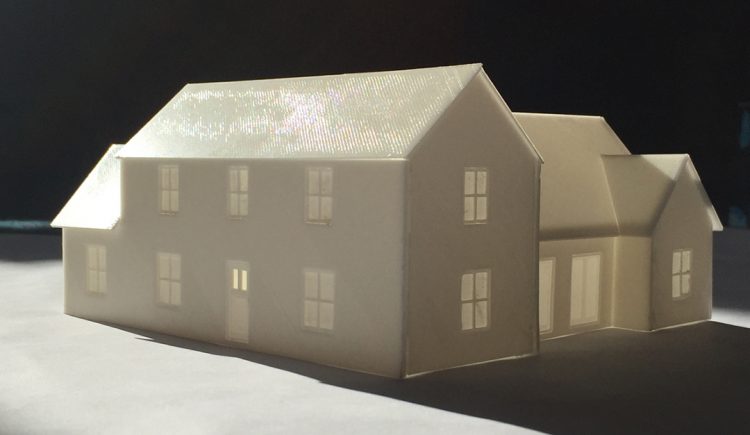(TNS)—Rancho Mirage, California, the desert playground city dotted with resorts and golf courses, is about to get a jolt into the 21st century. Development group Palari just named it the site of the country’s first 3D-printed community, which is set for completion by next spring.
The Coachella Valley community will cover five acres and include 15 eco-friendly homes—all of which will be made from 3D-printed panels by Mighty Buildings, a construction technology company based in Oakland.
Each property will include a three-bedroom, two-bathroom home of 1,450 square feet on a 10,000-square-foot lot with a swimming pool and deck for $595,000. A few will feature an additional 700-square-foot ADU with two bedrooms and a bathroom for $850,000.
They also offer high-tech Darwin wellness systems by New York-based Delos, with water filtration and circadian lighting. Optional upgrades include a pergola, cabana, hot tub, fire pit and outdoor shower.
The pre-sale campaign started in late February and sold out within days, with buyers paying $1,000 to reserve a spot, according to Palari CEO Basil Starr.
“It was reassuring to see such demand for these homes,” Starr said, adding that most of the buyers were tech-savvy millennials with a passion for sustainability. Palari accepted cryptocurrency for the deposits, and two buyers paid in Bitcoin.
The construction will take only a matter of months, but the project has been years in the making. Alexey Dubov co-founded Mighty Buildings in 2017, and, in the time since, he and his company of over 100 employees have been developing the 3D-printing technology and becoming certified by Underwriter Laboratories, the company that tests for safety and sustainability standards.
What was once a 7,900-square-foot garage operation in Redwood City has turned into a 79,000-square-foot warehouse in Oakland that uses robots to print a composite material the company invented called Light Stone Material. The synthetic stone hardens when exposed to UV light, which makes it both stronger and lighter than concrete with a longevity of more than 70 years.
“It feels like a countertop in a kitchen. Because it’s lighter, we reduce costs in transportation,” Dubov said. He added that the material is also more thermal efficient than concrete, reducing the energy needed to maintain the home’s temperature.
The 15-home community will be Mighty Buildings’ biggest project by far.
The company delivered its first 3D-printed panels last January and has created about 10 homes since, but the factory will pump out homes at a blistering pace going forward. It’s currently backlogged through the rest of the year and secured $40 million in funding last month, which Dubov said will go toward scaling manufacturing capabilities.
For the Rancho Mirage project, the homes come as a kit and fit together like Lego bricks. Mighty Buildings is producing the interior and exterior walls, which come with connectors so they can be easily assembled onsite.
Starr said a typical project of this scale would take around three years, but they’re planning for no more than a year and a half since his team can work on the foundations and roads in parallel with Mighty Buildings printing the material for the homes. He claims the houses will take one month to install as opposed to three to six months using traditional methods.
Palari emphasizes sustainability, and Starr said current homebuyers feel the same. In searching for a home-building partner for the project, he toured 20 factories but ended up pursuing Mighty Buildings for its trailblazing technology and UL certification.
A typical wood-framed house requires cutting the lumber down to size, and the leftovers often end up in a landfill, while 3D printers generate the exact material needed. In addition, the automated process uses 95% less manpower because robots create the panels.
“There hasn’t been a focus on sustainability in construction. The only focus has been building cheaper, which has created this system of wood-framed construction,” Starr said.
Coronavirus has slowed the project slightly, but it also opened up buyers to the possibility of living in a place like Rancho Mirage, which is typically known as a resort city with a rapidly shifting population depending on the season.
“The pandemic has shifted buyer preferences from condos to single-family homes. A lot of people are working from home and considering new locations such as Rancho Mirage, and that’s adding to these homes’ value,” Starr said.
Beverly Hills-based Palari chose Rancho Mirage for its proximity to L.A. and the relatively cheap land, and the city itself was supportive of the company’s sustainability goals. Going forward, Palari is planning communities elsewhere in the Coachella Valley as well as northern and central California and the San Fernando Valley.
“Our big focus is on California,” Starr said. “It’s the biggest single-family market in the world.”
©2021 Los Angeles Times
Distributed by Tribune Content Agency, LLC











